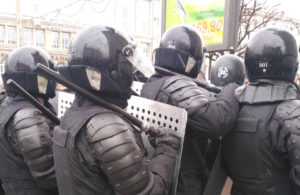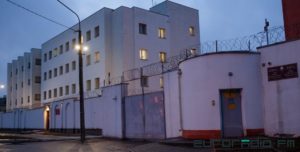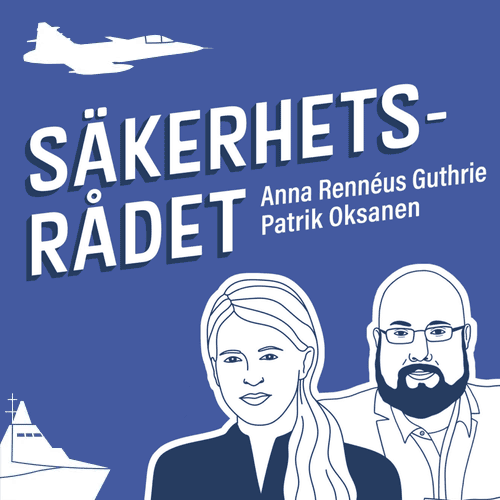This article is part of the Let The World Hear Project, which is a collaboration between Stockholm Free World Forum’s webzine Säkerhetsrådet and a number of Belarusian volunteers. Together we have gathered stories from victims of the dictatorship regime in 2020. The world must know what happened.
Read more about the project here.
This is the story of 37-year-old Tatsiana, who works for the non-governmental TV-channel Belsat TV.She was detained on 10 august 2020.

The Belarusian OMON. Photo: Wikimedia
I am an employee of Belsat TV. It’s the only non-governmental TV-channel in Belarus, a project of Poland and the EU. I was previously an operator and news reporter. Right now, I’m working in the social media marketing department, and my husband is a videographer.
My husband was working during the protest action on 9 August near the Obelisk*. He was supposed to be working on the 10th as well, so I drove him to the city centre, close to the Obelisk, where the clashes had taken place the day before. Fifteen minutes later I tried to call him, but he didn’t pick up his phone – just minutes after he got out of the car, he was seized by the OMON. They opened his backpack, saw the camera and immediately threw him in an avtozak. The fact that he is a member of the press probably played against him.
I tried unsuccessfully to reach him through calls, and three hours later I went to the central district police station with my friends in order to obtain information about him. There were many other people trying to find their relatives: an elderly couple looking for their son; a woman whose son was seized right in front of her; a younger couple searching for their teenage son; a young woman looking for her boyfriend; and so on. We weren’t given any information, and one of the women started arguing with a police officer. Ten minutes later two avtozaks appeared by the entrance. The OMON jumped out, took us by the arms and threw us all in the wagons, without introducing themselves or explaining the reasons for the detention.
Ten minutes later we were transferred to another wagon, then to another one, with metal cells designed for one person. However, two/three people were packed into each cell. A girl in the cell next to ours was diabetic, and thus insulin-dependent. She wasn’t feeling well, and we asked the police to call the ambulance – no one did.
We were taken to the notorious Akrestina detention centre. They were very brutal there – they kept yelling, “faster, you bitches!”, ”face the wall!”, and “don’t you dare say a word or make a move!”. We were led through a corridor, followed by the OMON and we noticed many men on their knees, face down with hands behind their backs. They were kneeling against the wall, naked or in their underwear. We heard people screaming when they were brutally beaten. We were led into a room where they took our names. We were then forced down onto our knees in the same line with the men in the corridor. One by one we were taken into a room and ordered to take off our clothes. There was a video camera in the room and the door was open. We were ordered to squat naked – it was a so-called “examination upon admission”. After that we returned to the corridor – back on our knees, hands behind our backs and face down. When the “examination” was done, we were taken to the isolator cell.
The cell was designed for four people: ten square metres with two bunk beds, a sink and a toilet. By that night there were 20 of us. We had all been seized randomly. One of the girls, who lived near the Obelisk, was out to feed homeless cats – she was seized wearing her indoor clothes and holding a pack of cat food in her hands. One of the girls was detained right in front of her porch, her mobile phone was checked and subscription to several opposition Telegram channels was found.
My detention lasted for two and a half days. During that time I witnessed completely random women coming in and out of our cell. I met over 80 people during this time – only one woman was actually seized due to attending the protests. Some women were volunteering by handing out bandages, and they were stopped and detained by the OMON while going home by taxi. One of the detained girls had terrible wounds to her legs. She and her friend were detained right on the road, pulled out of the car and beaten. Some of them were hit in the back of the head with a truncheon. One of the girls had been mistaken for a guy, and she was seriously hit on the leg; I suspect she had a ligament or tendon rupture as her leg was swollen and she was in pain. We asked for a doctor, but no one would listen.
The diabetic girl’s condition was getting worse, and she urgently needed insulin. We all desperately cried for help, and eventually they allowed her to take her insulin that was given through a little window in the cell-door. The girl who was hit in the back of the head experienced double-vision. She was given regular painkillers and that’s it.
People kept arriving at the cell as time went by. The first night there were 20 of us; the next night there were 33; on the third night, when I was released, there were 46. We were fed only once during the entire detention: a plate of oat porridge.
The worst experience was the sound of arriving avtozaks, followed by desperate screams of the detained men. They would scream in pain for about 15 minutes upon the arrival to Akrestina, then another wagon would arrive – and all would start from the beginning. We heard grown men screaming for their mothers as we stood there locked in the cell, absolutely helpless. It would happen six or seven times a night. We heard how people were stuffed in the cells during the night, and during the day, they were taken somewhere else, probably to Zhodzina or Slutsk**.

Akrestsino Detention Center. Photo: Euroradio
Our wardens were, probably, OMON representatives, not the ordinary employees of Akrestina, and they obviously had an order on intimidation and harassment. We, the women, were not beaten unlike the men, yet we were humiliated; for example, we were commanded to do the “saw-wing” pose, bending down holding our hands as high as possible behind our backs. Once, we were taken into the corridor in order to update the name list, where one of the wardens from the OMON – a very brutal woman – forced us into the “saw-wing” position, twisting our arms and bending us down. My friend who wasn’t able to bend low enough, received a knee-strike in her stomach. There were older women too who, when forced into the “saw-wing” position, would just fall down. Everything that could be done normally was done with senseless humiliation. There was no court, no charges and no lawyers.
I was released after having signed a so-called “prosecutor warning”, suggesting that I not get detained for a second time otherwise it would count as a criminal offence. A very strange paper, legally speaking. I wasn’t given a copy, so I can’t present it.
Those who weren’t released the same day as me had a trial. The trial, of course, was held in Akrestina, without the presence of lawyers. My friend refused to sign the agreement, as the content was completely deceitful: the statement declared that she was an active protest figure and had been detained during the illegal mass protests. When she refused to sign it, that woman from the OMON took her into the corridor and kicked her in the stomach, and as the result, my friend was hospitalized upon the release. She was diagnosed with abdominal contusion and suspected ovarian rupture. However, they edited her statement, writing the actual place of our detention, i.e. at the Central district police station, though it was stated that she was protesting in front of the police station and behaving inadequately.
NM: For how many hours in total were you detained?
53 hours.
NM: While you were being released, were you told anything?
From the original group of people that were detained during the same period of time, there were 16 of us left at some point. Eight of us, including myself, were let out of the cell at night, our names were read out loud, each one of us signed that “prosecutor warning” and then we were released. The remaining eight had to stay in the cell. According to the law, the authorities may detain us for 72 hours for “clarification of circumstances”. Those women were released only the next day after the trial, being sentenced to fines.
NM: As I understand, you actively participate in political life, filming reports for Belsat. Was this your first detention?
This kind of detention happened for the first time. It wouldn’t have been as traumatic for me or others if it had been a regular detention, with no such harassment and violence. I know how it usually goes: people often complain about not being able to receive packages from their relatives or that there are 16 people in a cell designed for eight. It is an exceptional situation nowadays. Usually people are not tortured upon arrival, not forced to be naked on their knees against the wall or walk in the “saw-wing” position. After all, we were administrative detainees, not criminals.
It was clear that everything was aimed towards intimidation and loss of morale. It was done with a conveyor belt-technique: hundreds of people were transported there every day, held for a few days and then released, completely exhausted and debilitated. One young man who was released the same day as I told me why the men were screaming: when an avtozak arrived, the door would open and the OMON would be standing in two lines along the way, forming a corridor. The men were forced to run through this corridor one by one, receiving numerous punches with truncheons. When they reached the end of the corridor, they were barely crawling. Every night ambulances were taking people to hospital as they were beaten almost to death. The aim was to destroy people mentally and physically, and they succeeded. This young man told me that he would never again go out in the streets and that he would warn his friends against doing so.
NM: How was the atmosphere in the cell? Was there solidarity and mutual help?
Yes. There were no conflicts and everyone was very friendly. Of course we were all suppressed, but we did our best to help each other; everyone was worried about the girl who had diabetes, about the girl whose leg was badly injured and swollen. We called for help and insisted on getting medicine to those who were in bad condition. We decided to keep in touch and share the news with each other in a special group chat.
NM: Regarding this terrible experience you went through: was there anything positive about it? Is there anything you learned about yourself?
Well, I now know many ways how three people can sleep together on a single bunk. Otherwise, it was just a senseless and ruthless traumatic experience. The only positive thing for me is that I’m not as traumatized as many others. I can talk about it, unlike many who went through hell and are not yet able to speak about their experience, although they have much to tell. I really hope that we get to hear their stories soon.
NM: Despite everything that happened to you, are you planning to participate in the upcoming events? Do you see any point in it whatsoever?
Of course it makes sense. You know, when being locked in that cell, you feel that all hope is lost, that they’ve won, but when you get out, you realize that the people are not willing to stop the resistance, you see how many are involved, you feel the support – nothing similar has ever happened in our country. It makes me feel that everything that has happened was not in vain, and, sadly, this huge wave of protests in our society wouldn’t be possible without these sacrifices.
The senseless and merciless tortures – this is what caused the society to rise, followed by the fact that Lukashenka gave himself 80 percent of the votes. That has happened before, yet our country has never experienced such terrible tortures on a mass scale. It is a societal uprising at a very high cost, especially regarding those who have been killed and those still missing. I want to believe that everything we are going through today is not in vain.
* The Minsk Hero City Obelisk was erected in 1985 in honor of the 40th anniversary of the Great Patriotic War. In 1974 Minsk was honored with the title of hero city for the courage and bravery its residents demonstrated during the Nazi occupation that lasted for 1,100 days and nights.
** Towns with prisons in Belarus.
The story was originally told in Russian to Nemiga M. and translated by Darya L.
